三)上帝掌心中的一粒红果
英国的园艺家们读了《爱玛》之后,不禁拍案而起 - 原来简.奥斯汀还是草莓行家,她对十九世纪初期的草莓品种了如指掌,通过埃尔顿太太之口娓娓道来。
最早,欧洲原生的野草莓叫林地草莓(wood strawberry, 学名Fragaria vesca)。野草莓并没有出现在古埃及和古希腊的艺术作品中,圣经中也没有提及,因为这些地方的气候太炎热,不长野草莓。野草莓生长在意大利和法国的山麓丘陵等不易被采摘的地方,故而出现在古罗马人的作品中。古罗马人植物学知识有限,以为草莓有两种:灌木型的草莓树(strawberry tree)和长在地面上的草本草莓(ground strawberry )。
古罗马诗人维吉尔(Virgil, 公元前70年-公元前19年)在《牧歌》(Eclogue)第三卷里写道:“你们这些从草丛里采花和草莓的男孩们,赶紧离开,一条冰冷的蛇潜伏在草里面。”(You lads who cull flowers and strawberries that grow so low, begone from here; a chill snake lurks in the grass.)诗文中的草莓的拉丁语为“humi nascentia fraga”,乃野草莓。
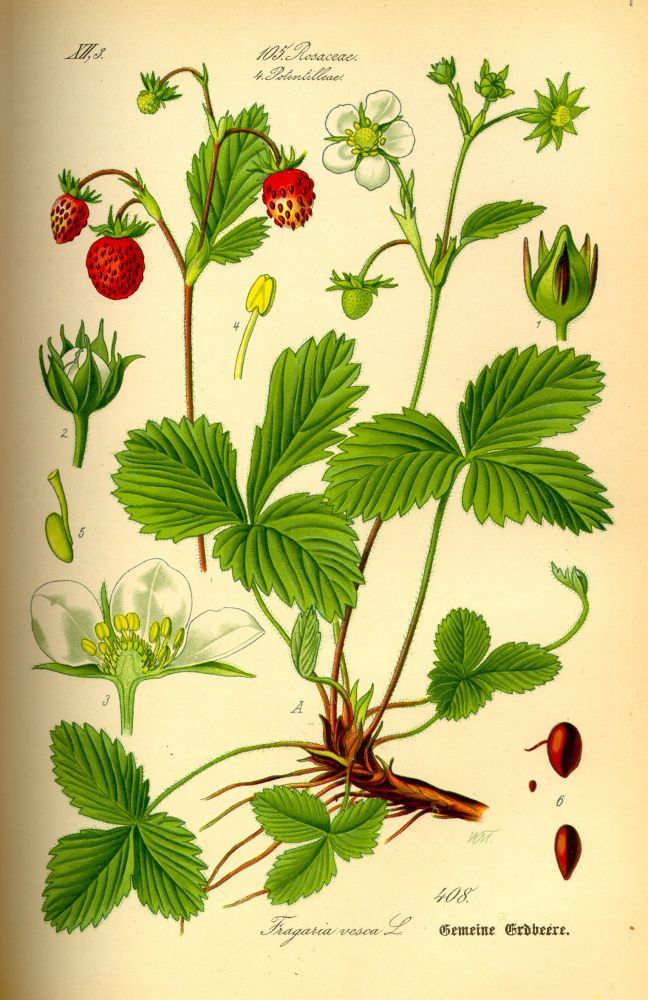
古罗马诗人奥维德(Ovid,公元前43年-公元17/18年)在其作品《变形记》(The Metamorphosis)第一卷第三章的《黄金时代》(the Golden Age)中写道:
“首先建立的是黄金时代,那时人类刚刚产生,
没有法律,但人人知晓正道,
并发自内心地追求信义。
没有刑罚,没有恐惧,
创世主的训诫简洁明了,他的心地诚恳。
没有成文的法律,没有人受压迫:
人类的律法写在他的胸中:
没有在法官面前喊冤的人群,
法院尚未建立,不需要审判:
大家都安全地生活着,凭着良心行事。
那时远处山林里的松树
还未被砍伐做成船只,
人们尚未扬帆出海探索异邦:
快乐的世人们无需多虑,
只在本乡逍遥自在。
没有高墙、围栏、尘埃和土墩,
听不到鼓声与小号愤怒的声音,
不需要制造刀剑,没有犯罪现象发生,
人们享受着清福。
富饶的大地,无须用锄犁去耕耘,
无需强迫,就能生出各种物品:
大自然任意产出食物,让人们心满意足。
他们吃着野苹果和草莓,
还有山茱萸和荆棘上的浆果,
从树上落下的橡子装饰着盛宴。
田野和草地自行长出繁茂的花,
西风送暖四季常春,
无需索取,无需休耕,
大地随后长出沉甸甸的麦穗。
溪中流出的是牛乳和甜浆,
蜂蜜从橡树中汩汩淌出。”
(The golden age was first; when Man yet new,
No rule but uncorrupted reason knew:
And, with a native bent, did good pursue.
Unforc'd by punishment, un-aw'd by fear,
His words were simple, and his soul sincere;
Needless was written law, where none opprest:
The law of Man was written in his breast:
No suppliant crowds before the judge appear'd,
No court erected yet, nor cause was heard:
But all was safe, for conscience was their guard.
The mountain-trees in distant prospect please,
E're yet the pine descended to the seas:
E're sails were spread, new oceans to explore:
And happy mortals, unconcern'd for more,
Confin'd their wishes to their native shore.
No walls were yet; nor fence, nor mote, nor mound,
Nor drum was heard, nor trumpet's angry sound:
Nor swords were forg'd; but void of care and crime,
The soft creation slept away their time.
The teeming Earth, yet guiltless of the plough,
And unprovok'd, did fruitful stores allow:
Content with food, which Nature freely bred,
On wildings and on strawberries they fed;
Cornels and bramble-berries gave the rest,
And falling acorns furnish'd out a feast.
The flow'rs unsown, in fields and meadows reign'd:
And Western winds immortal spring maintain'd.
In following years, the bearded corn ensu'd
From Earth unask'd, nor was that Earth renew'd.
From veins of vallies, milk and nectar broke;
And honey sweating through the pores of oak.)
诗行中的草莓指的是arbuteos fructus montanaque fraga , 即arbutus (荔莓),原生于地中海的一种杜鹃花科的常青灌木,果实形似草莓,又称草莓树strawberry tree,与草本草莓没有任何亲戚关系。

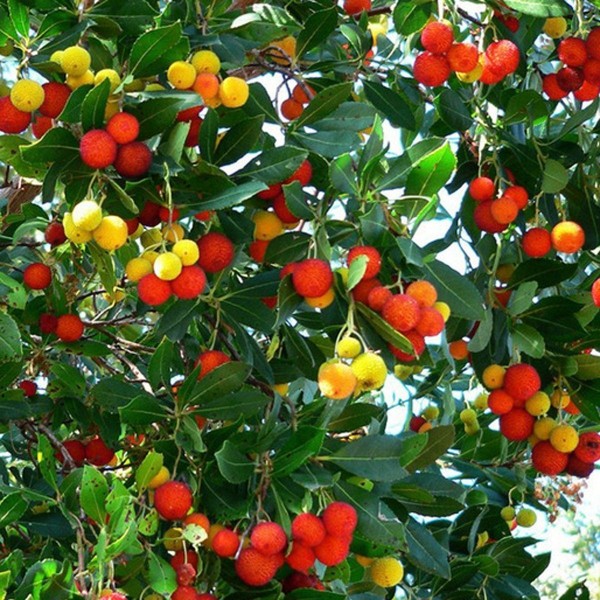
《变形记》的第13卷,海洋女神卡拉蒂(Galatea)与西西里岛上的牧羊少年埃西斯(Acis)相爱。卡拉蒂有着乳白的肌肤和动人的美貌,岛上的巨人波利夫莫(Polyphemus)对她一见钟情,展开了疯狂的追求。他对着她又吹笛子又唱情歌:
“哎,卡拉蒂,比牯牛
还难征服,不愿接受轭束,
比打结的橡树更加顽固。
像顺滑的溪流,无法抓住,
和溪流一样荒谬,似泉水一样冰冷。
比柳树更加翘曲,拒绝
我温暖的拥抱,比葡萄藤蔓还脆,
以冷蔑自持,无法撼动;
似纹理更为坚硬的岩石。
比奔流的洪波还要暴力,
比盛誉的孔雀骄傲一倍。
猛烈如火,犀利如蓟。
比怀孕的母熊更令人生畏,
像浪涛一样对我的誓言充耳不闻。
比被踩中的毒蛇还会报复。
比飞驰的动物后腿还敏捷迅速,
溜得比暴风雨和疾风还快。
我可以忍受所有的缺点
唯一害怕的是迅捷这个恶习。
如果你对我很了解,就不会躲避
我的爱,而是直奔我的怀抱。
该轮到你憔悴了,乞求我留下来,
为你的不明智的厌恶而深感懊悔。
我那位于岩石中的宫殿,
乃大自然的鬼斧神工之作,宽敞宜人且阴凉,
热量无法穿透,严寒不能入侵。
我的花园里到处是果实,
成串的葡萄灿如黄金,
某些葡萄串上带着紫晕,
所有的一切都是留给你的。
树荫下的红色草莓,期待直起身子,
以被你的玉手采到为荣。
随后秋天的山茱萸为你奉上果实,
为了诱使你转身,李子展示光泽的一面,
它们不是那些普通的品种,而是费阿刻斯人
果园里能够生长出的唯一品种。
你不会缺少栗子,
不会缺少花园水果和林子里的野苹果,
每根树枝都为你结满了累累果实,
一整年的收成全是你的。”
(Yet, Galatea, harder to be broke
Than Bullocks, unreclaim’d to bear the Yoke,
And far more stubborn than the knotted Oak:
Like sliding Streams, impossible to hold;
Like them fallacious; like their Fountains, cold:
More warping than the Willow, to decline
My warm Embrace, more brittle than the Vine;
Immoveable, and fixt in thy disdain;
Rough, as these Rocks, and of a harder grain.
More violent than is the rising Flood:
And the prais’d Peacock is not half so proud.
Fierce as the Fire, and sharp as Thistles are;
And more outragious than a Mother-Bear:
Deaf as the billows to the Vows I make;
And more revengeful, than a trodden Snake.
In swiftness fleeter than the flying Hind,
Or driven Tempests, or the driving Wind.
All other faults with patience I can bear;
But swiftness is the Vice I only fear.
Yet, if you knew me well, you wou’d not shun
My Love, but to my wish’d Embraces run:
Wou’d languish in your turn, and court my stay;
And much repent of your unwise delay.
My Palace, in the living Rock, is made
By Nature’s hand; a spacious pleasing Shade;
Which neither heat can pierce, nor cold invade.
My Garden fill’d with Fruits you may behold,
And Grapes in clusters, imitating Gold;
Some blushing Bunches of a purple hue:
And these, and those, are all reserv’d for you.
Red Strawberries, in shades, expecting stand,
Proud to be gather’d by so white a hand.
Autumnal Cornels latter Fruit provide,
And Plumbs, to tempt you, turn their glossy side
Not those of common kinds; but such alone
As in Phæacian Orchards might have grown:
Nor Chestnuts shall be wanting to your Food,
Nor Garden-fruits, nor Wildings of the Wood;
the laden Boughs for you alone shall bear;
And yours shall be the product of the Year.)
(注:Phaeacian ,费阿刻斯人, 荷马史诗《奥德赛》 (Odysseus) 中居住在费阿刻斯岛的一个民族,以航海为生)
情歌里的草莓的拉丁语为mollia fraga,即野草莓。
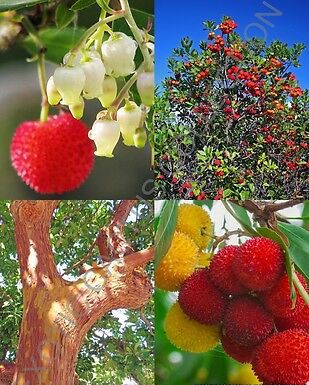
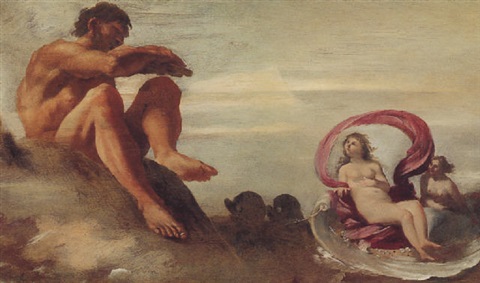
古希腊博物学家老普林尼(Pliny the Elder,公元23/24年 – 79年)在他的著作 《自然史》(Natural History)里解释了草莓树与地草莓的区别,现将第15卷第28章关于草莓树的一段翻译如下:
“地草莓的果肉和与之相关的树草莓的果肉是不同的。草莓是唯一一种能长在灌木上和地面上的水果。草莓树是一种灌木,果实需要一年的时间才能成熟,第二茬花开时,旁边挂的是第一茬的正在成熟的果实。权威们对究竟是雄性植物还是雌性植物不结果有不同看法。果实不受重视,人们最多只吃一粒,故而得名。不过希腊人用comaron和memaecylon这两个名字来称呼它,说明该植物有两个变种。我们给它起了另外一个名字:arbutus。朱巴说,在阿拉伯草莓树长到75尺高。”
(The flesh of the ground strawberry is different from that of the strawberry-tree which is related to it, the strawberry being the only fruit that grows at the same time on a bush and on the ground. The tree itself is a sort of shrub; the fruit takes a year to mature, and the following crop flowers side by side with the earlier crop when it is ripening. Authorities disagree as to whether it is the male plant or the female that is unproductive. The fruit is held in no esteem, the reason for its name being that a person will eat only one! Nevertheless the Greeks call it by the two names of comaron and memaecylon, which shows that there are two varieties of the plant; and with ourselves it has another name, the arbutus. Juba states that in Arabia the strawberry tree grows to a height of 75 feet. )
当然,以上的文字将草莓树与草本草莓视为一个物种,犯了明显的错误。但对草莓树的描写是细致的,符合实情的。
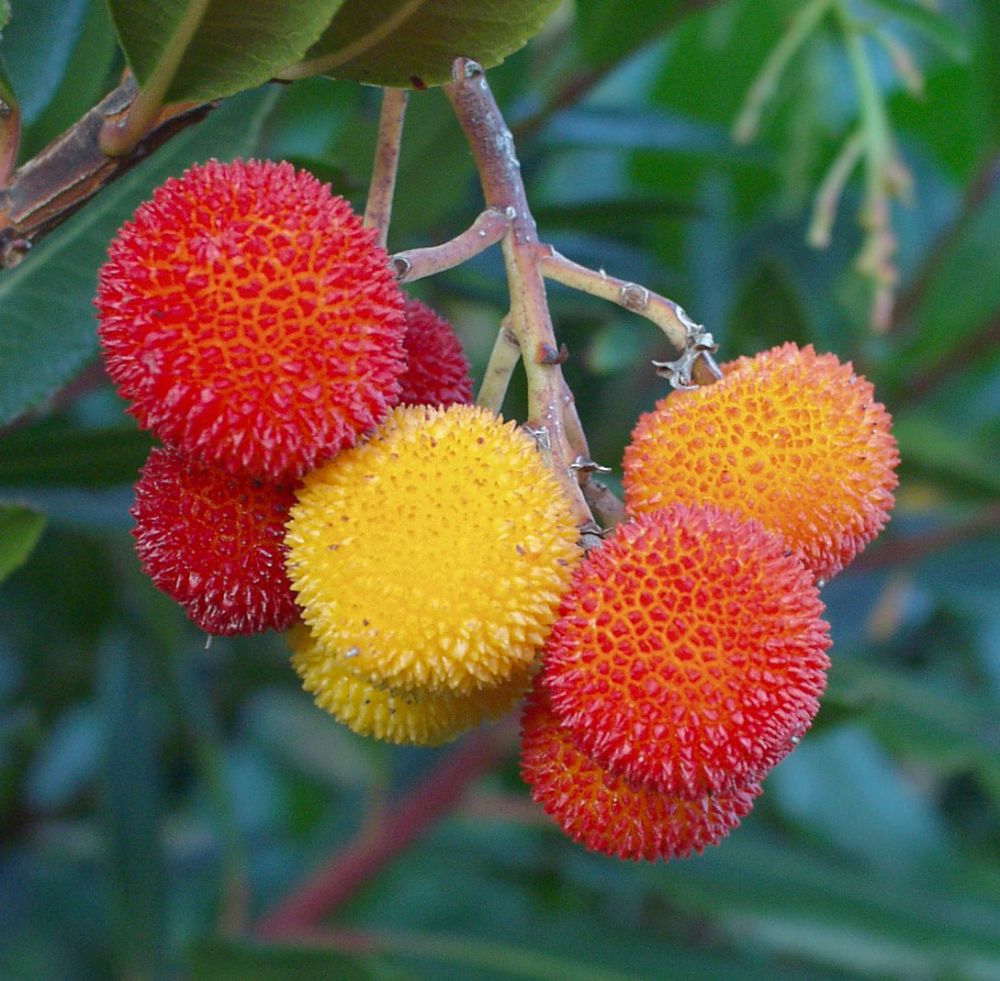 (草莓树)
(草莓树)
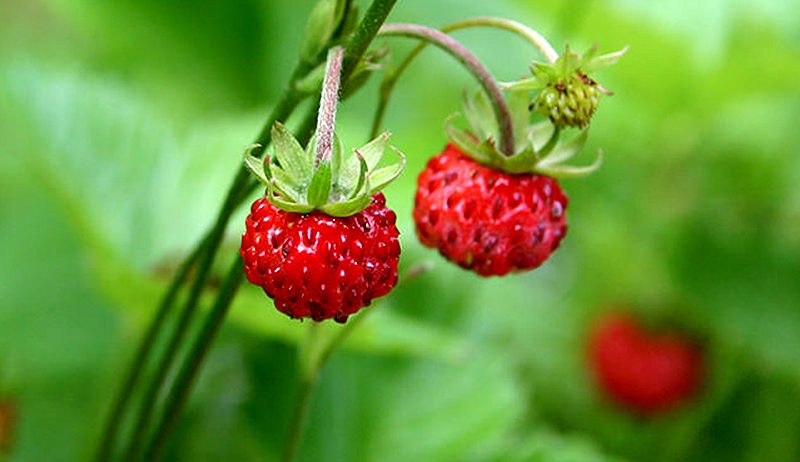
(地草莓)
欧洲的野草莓果实很小,有红色和白色的,味道一般,古罗马人将果实腌渍了吃,但并不视其为重要水果。
自那以后,几个世纪过去了,任何欧洲的文学作品里都再也没有提到草莓。
十二世纪初,德国神学家、博物学家和女修道院院长圣赫德嘉·冯·宾根(Saint Hildegard von Binger,1098年-1179年)宣称野草莓不宜食用,因为毒蛇和蟾蜍有可能从低矮的草莓丛爬过。她的话对当地的政客产生了深远的影响,他们也发表了类似的声明,好长一段时间,许多欧洲人不再吃野草莓。
从十四世纪初开始,法国人零星将野草莓植株引种在花园里。1368年,法国国王查理五世在巴黎卢浮宫的花园里栽植了1200株野草莓,几年后,法国勃艮第公爵和公爵夫人(Duke and Duchess of Burgundy)将第戎附近的四块大地变成他们的野草莓田。
十五世纪,野草莓首次出现在德国的植物学著作《Herbarius Moguntinus》中,有趣的是,这本书只将其视为草药,并没有介绍它的食用价值。
从十六世纪开始,不起眼的野草莓成为英国宴会的最后一道甜品,主人用当时颇为昂贵的糖和香料来做草莓甜点,籍此显耀自己的财富。只有农民才吃新鲜的草莓,上流社会的人们认为吃新鲜水果是有危险的,他们将煮熟了或烘烤过的草莓做成布丁之类的甜点,或用草莓来煮粥、炖菜和熬浓汤。

1560年,英国国王亨利四世的私人医生Bruyerin-Champier写道,英国女士非常喜欢享用涂着奶油的草莓,她们开始在自己的花园里小片种植草莓。当时流行的园艺书籍提供了有关草莓栽培的信息,并指出在家庭花园中种植的草莓果实要比野外采集的果实大。
英国农民诗人托马斯.杜塞尔(Thomas Tusser,1524 – 1580)在其最著名的著作《农牧的五百大好处》(Five Hundred Points of Good Husbandry)中提出了一项轰动的建议 – 将种植草莓作为妇女就业的一部分,并赋诗一首:
“贤妻,快到园里,辟一方地
种下草莓,此物乃世间珍奇,
野外林地,藏身荆棘,
精心挑选,温柔采摘,果中佳品”
(Wife, into the garden and set me a plot
With strawberry roots, the best to be got.
Such growing abroad among thorns in the wood,
Well chosen and picked, prove excellent good.)

前往北美的欧洲探险家陆续留下了关于新大陆的野生草莓的文字。英国探险家托马斯·哈里奥特(Thomas Hariot)于1588年在他的日记里记录了弗吉尼亚地区的草莓,说其个头大于欧洲品种,风味更浓,并将植物标本带回了伦敦。
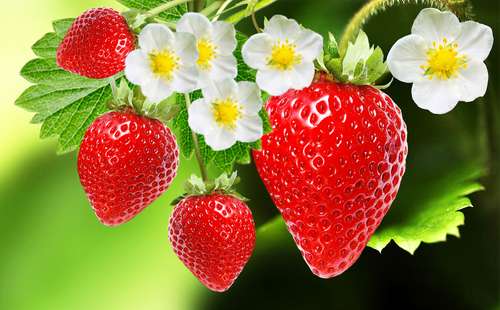
(弗吉尼亚草莓)
十六世纪末,另一种原生于欧洲的麝香草莓(musk strawberry, Fragaria moschata)也被引进了花园。
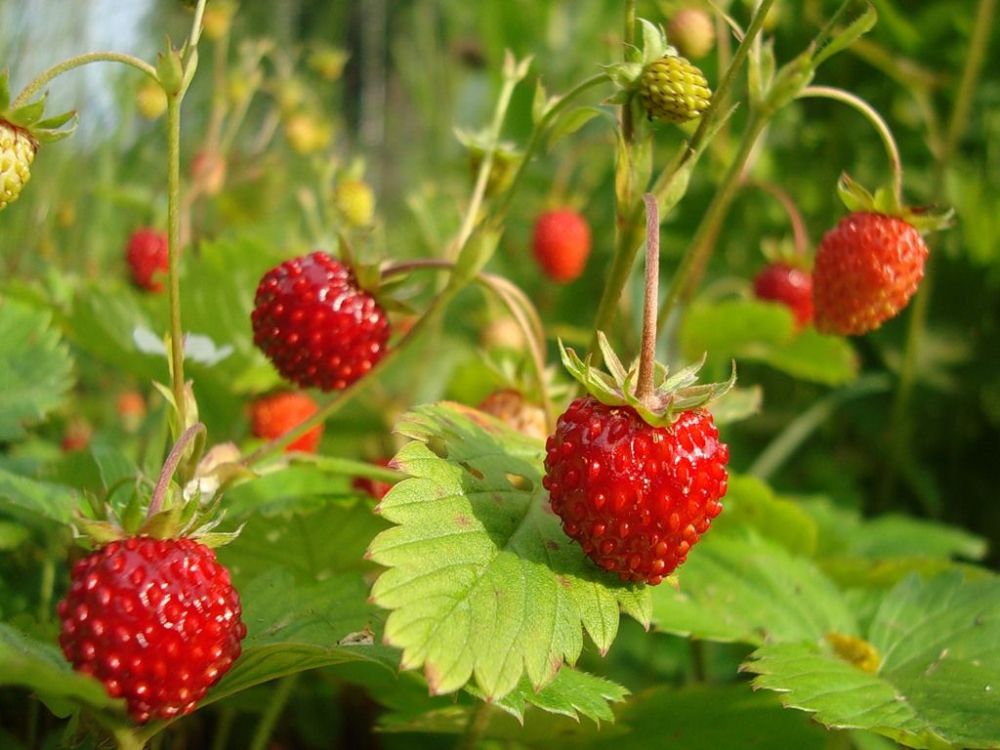
(麝香草莓)
十八世纪初,法国的一名航海工程师发现了原生于智利的一种大草莓,果实与核桃差不多大小,有的果实甚至大如鸡蛋。他将一些智利草莓植株带回法国栽种,却一直没有结果。原来他并没有意识到智利草莓是雌雄异株的,他带回来的全是雄株,无法繁殖后代。三十年后,有人在这些智利草莓旁栽了一些弗吉尼亚草莓,南美草莓与北美草莓无意间结合,发展出了新的品种,果实比绝大多数品种更大且风味独特,被园艺家命名为花园草莓(garden strawberry, 学名Fragaria x ananassa)。英国人将法国人无意中培育出的花园草莓发扬光大,完成了大部分的早期育种工作,推出了现代草莓系列,也就是今人嘴里常说的“草莓”,如今农场里种植的和商店里出售的大多数是这个品种。
其实酷爱草莓的英国人从十七世纪开始就将不同品种的草莓进行杂交,经过不断的实践,直到1806年,果实硕大红艳又甜美多汁的草莓才被成功培育出来,起名Chili(辣椒莓)。简.奥斯汀的小说《爱玛》于1815年12月出版,书中埃尔顿太太讲述的Chili就是这种莓子。
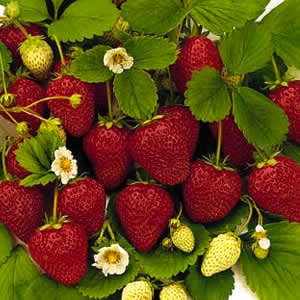 (花园草莓)
(花园草莓)
小说《爱玛》发表后不到两年,简.奥斯汀去世。她去世后两年,英国著名的园艺家和植物学家托马斯.耐特(Thomas Andrew Knight)推出了一种高品质的草莓,叫“埃尔顿莓”(Elton)。很多人以为,他是受了女作家的影响才给草莓如此命名,其实这只是个巧合。
但女作家对大自然、对草莓的热爱是有目共睹的,她在1811年写给姐姐卡桑德拉(Cassandra)的信中提到:“我惊喜地发现了几颗非常成熟的红草莓- 如果你在家就好了,这种乐趣是一去不返的!(I had the agreeable surprise of finding several scarlet strawberries quite ripe – had you been at home, this would have been a pleasure lost!)
她将对生活细致的观察带进了她的小说,创作态度严谨,作品多为传世之作,令当今的所谓流量作家汗颜。




